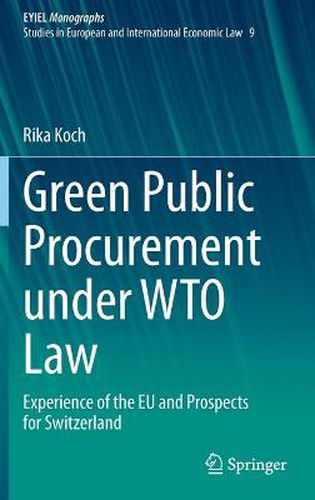Readings Newsletter
Become a Readings Member to make your shopping experience even easier.
Sign in or sign up for free!
You’re not far away from qualifying for FREE standard shipping within Australia
You’ve qualified for FREE standard shipping within Australia
The cart is loading…






This title is printed to order. This book may have been self-published. If so, we cannot guarantee the quality of the content. In the main most books will have gone through the editing process however some may not. We therefore suggest that you be aware of this before ordering this book. If in doubt check either the author or publisher’s details as we are unable to accept any returns unless they are faulty. Please contact us if you have any questions.
This book investigates the strategic use of public procurement as a way to establish buying green as a common practice - not only in the EU, but all over the world. However, imposing environmental requirements may affect the conditions of competition between suppliers, especially between local and foreign ones. This is particularly relevant for signatory states to the Government Procurement Agreement (GPA), a plurilateral WTO agreement that aims at liberalizing public procurement markets. So how can these countries strike a balance between trade concerns and using the environmental potential of public procurement? What scope does the GPA 2012 leave for environmental criteria and how are signatory states making use of it? The need for answers to these questions is becoming even more pressing with the increasing use of green public procurement (GPP).
This book discusses approaches to finding legal solutions to this question, using a multilayered approach to do so: In a first step, an analysis of the pertinent GPA provisions serves to delineate the scope for GPP under WTO law. In a second step, an evaluation of the implementation of the respective provision at the regional and national level by the EU and Switzerland helps reveal the impact of the GPA on its signatory states. While the book chiefly focuses on the legal framework for GPP, it also takes into account the latest developments in jurisprudence and policy initiatives. It concludes by proposing practical solutions regarding the specific design of GPP policies and measures in compliance with the GPA.
The comparative approach applied in the book, focusing on the implementation of the WTO/GPA by two selected signatories, makes it an informative and insightful resource for practitioners, policymakers and legal scholars from all GPA signatory countries, extending its relevance beyond the selected examples (the EU and Switzerland).
$9.00 standard shipping within Australia
FREE standard shipping within Australia for orders over $100.00
Express & International shipping calculated at checkout
This title is printed to order. This book may have been self-published. If so, we cannot guarantee the quality of the content. In the main most books will have gone through the editing process however some may not. We therefore suggest that you be aware of this before ordering this book. If in doubt check either the author or publisher’s details as we are unable to accept any returns unless they are faulty. Please contact us if you have any questions.
This book investigates the strategic use of public procurement as a way to establish buying green as a common practice - not only in the EU, but all over the world. However, imposing environmental requirements may affect the conditions of competition between suppliers, especially between local and foreign ones. This is particularly relevant for signatory states to the Government Procurement Agreement (GPA), a plurilateral WTO agreement that aims at liberalizing public procurement markets. So how can these countries strike a balance between trade concerns and using the environmental potential of public procurement? What scope does the GPA 2012 leave for environmental criteria and how are signatory states making use of it? The need for answers to these questions is becoming even more pressing with the increasing use of green public procurement (GPP).
This book discusses approaches to finding legal solutions to this question, using a multilayered approach to do so: In a first step, an analysis of the pertinent GPA provisions serves to delineate the scope for GPP under WTO law. In a second step, an evaluation of the implementation of the respective provision at the regional and national level by the EU and Switzerland helps reveal the impact of the GPA on its signatory states. While the book chiefly focuses on the legal framework for GPP, it also takes into account the latest developments in jurisprudence and policy initiatives. It concludes by proposing practical solutions regarding the specific design of GPP policies and measures in compliance with the GPA.
The comparative approach applied in the book, focusing on the implementation of the WTO/GPA by two selected signatories, makes it an informative and insightful resource for practitioners, policymakers and legal scholars from all GPA signatory countries, extending its relevance beyond the selected examples (the EU and Switzerland).